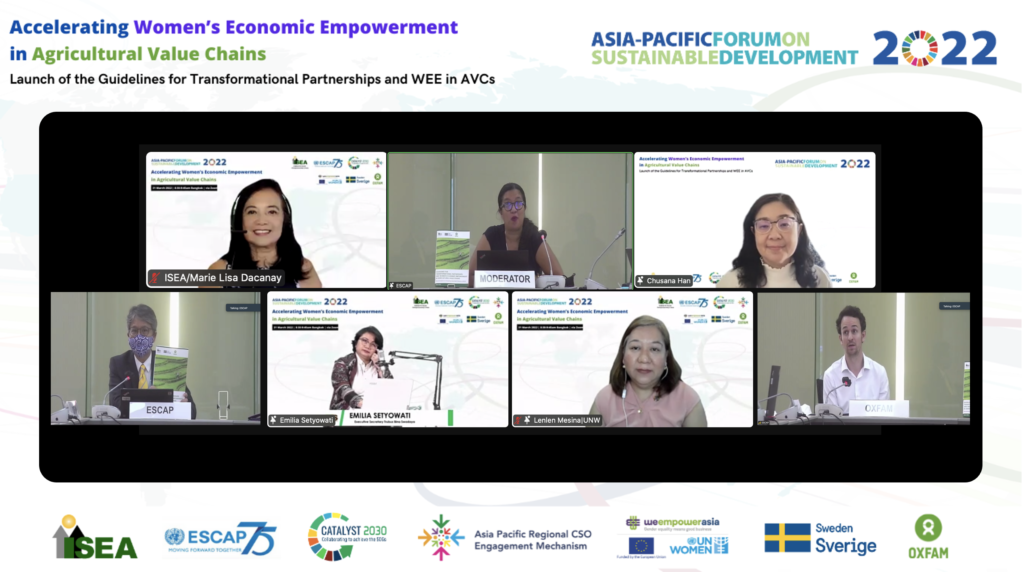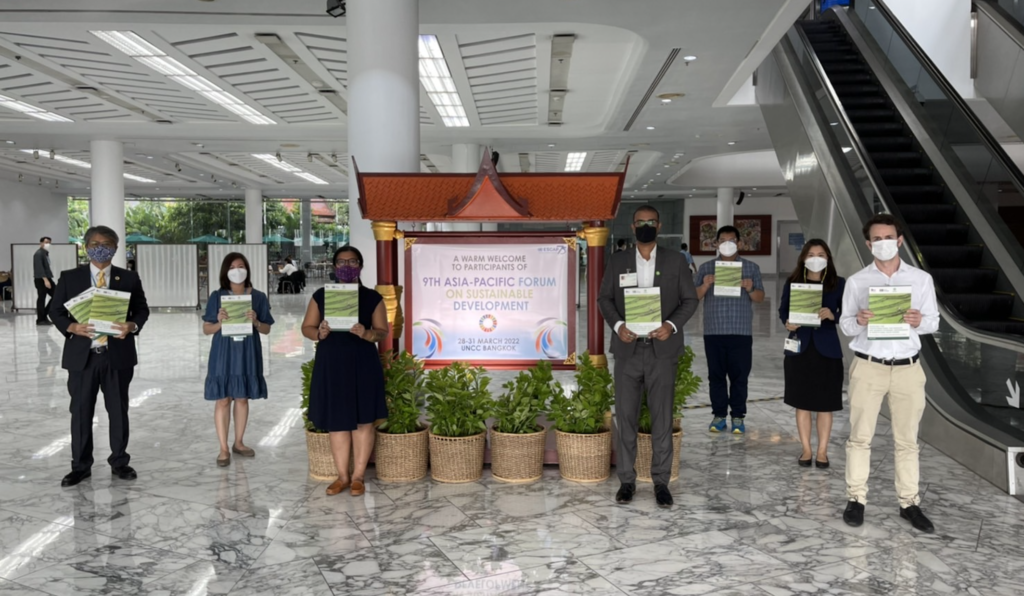Guidelines for Accelerating Women’s Economic Empowerment in Agricultural Value Chains Launched

Over 130 representatives from the public sector, civil society, and development organizations joined the launch of the Transformational AVC Guidelines yesterday, March 31. Developed by the Institute for Social Entrepreneurship in Asia (ISEA) and Oxfam, with support from the Embassy of Sweden, the new guide that sets to empower women and men small-scale farmers in Southeast Asia was the highlight of the hybrid roundtable discussion on “Accelerating Women’s Economic Empowerment in Agricultural Value Chains (AVCs)”.
“The Transformational AVC Guidelines are innovative program and policy recommendations that ASEAN and member states may consider to ensure that economic recovery strategies from the COVID-19 pandemic contribute to food security, resilience and empowerment of small-scale producers especially women in agriculture and agricultural value chains”, Dr. Marie Lisa Dacanay of ISEA explained.
The Transformational AVC Guidelines draw from a policy and action research undertaken by ISEA and its partners that look into the success factors in improving the lives, livelihoods and position of women and men small producers in agricultural value chains.
Emilia Setyowati, Executive Secretary of Trubus Bina Swadaya said, “Engaging more women in our value chain means providing more focus on creating women-friendly policies, practices, and technologies. This requires support and investment. The adoption of the Guidelines by ASEAN and its member states would provide leverage for enterprises like us to get support and much needed investments.” Trubus Mitra Swadaya is a partner of ISEA in mainstreaming WEE in their value chains.
Recognizing the importance of the Guidelines, Mr. Ruhimat Soerakoesoemah, Head of UNESCAP Subregional Office for South-East Asia said that “as the world continues to grapple with economic, social and environmental impacts of the COVID-19 pandemic, governments are working and seeking the support of stakeholders including CSOs in tracking the myriad issues and multi-dimensions of recovery. These Guidelines offer transformational pathways to two important areas most affected by the pandemic – the agriculture sector and women.”
“These Guidelines provide evidence-based gender analysis that is aligned and relevant with the ASEAN Gender Mainstreaming Strategic Framework and the ASEAN Gender Outlook”, said Dr. Chusana Han, Assistant Director of ASEAN Secretariat on the relevance of the Guidelines to ASEAN’s gender equality commitments.
Ms. Lenlen Mesina, Program Manager of UN Women WeEmpowerAsia expressed, “The Guidelines will enable us to have more detailed framework for those in the agricultural value chain to ensure that they are incorporating the WEE agenda and principles”.
Oxfam’s Ashley Aarons, who leads the Gender Transformative and Responsible Agribusiness Investment in South East Asia Programme (GRAISEA), closed the event with prospects for greater collaboration on linking the Guidelines to the wider and ongoing work on women’s economic empowerment in the region. He said, “I am inspired by all the ideas I have heard on how to take work forward in this key area, I saw the bases for collaboration, for instance in linking the guidelines to the UN Women’s Empowerment Principles, ASEAN’s increasing focus in this area and beyond that, potentially to the work of W+. We talked about women’s economic empowerment principles and the ongoing work in ASEAN and how we can link them to the Guidelines. I see great potential for collaboration.”

The event was moderated by Wardarina, Deputy Director, Asia Pacific Forum on Women, Law and Development (APWLD). The roundtable discussion cum launch was co-organized by the ISEA, UNESCAP Subregional Office for South-East Asia, UN Women WeEmpowerAsia, Catalyst 2030, Oxfam, Embassy of Sweden, and Asia Pacific Regional CSO Engagement Mechanism (APRCEM) – Social and Community Enterprise Constituency.
This is an accredited side event at the Asia-Pacific Forum on Sustainable Development 2022. Advancing women’s economic empowerment in the context of the COVID-19 pandemic and the climate crisis is critical to accelerate the implementation of Sustainable Development Goal 5 – Gender Equality.
Learn more about the Transformational AVC Guidelines here: https://www.isea-group.net/transformationalavcguidelines
